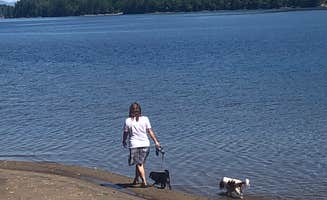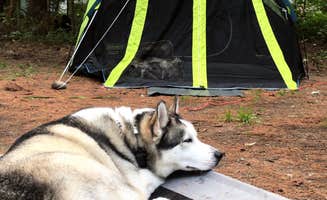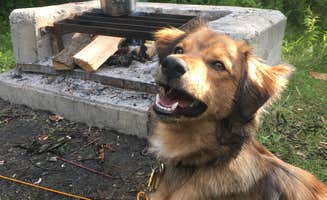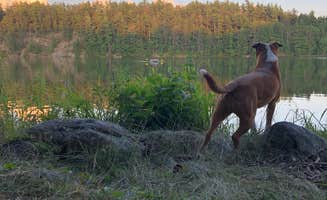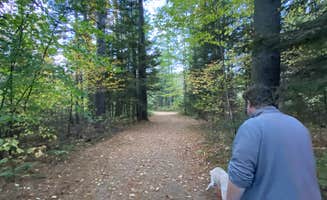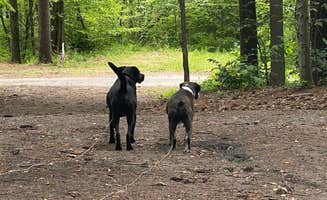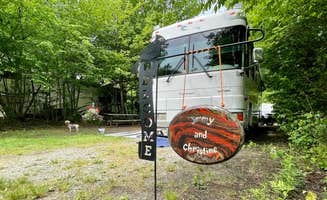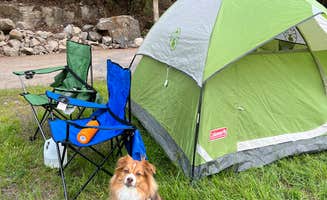Adirondack camping areas range in elevation from 1,000 to 5,000 feet, creating varied temperature zones throughout the region. Spring camping season begins mid-May when most campgrounds open, with fall camping continuing through mid-October at many locations. Temperatures can swing dramatically from day to night, particularly at higher elevations.
What to do
Paddling options: Putnam Pond Campground offers boat rentals and access to connected waterways. "We spent a day on the ponds (Putnam & North Pond are connected) and it is beautiful. The water is cool, clean and beautiful," notes Michael G., who also mentions the campground connects to several hiking trails.
Hiking trails: Frontier Town Campground provides well-marked hiking paths with access to surrounding wilderness. A recent camper noted, "The trails are well marked and well maintained. Overall, this is a fantastic campsite. There's even a brewery a ten minute walk down the road."
Swimming areas: Eagle Point Campground maintains a clean beach area for summer swimming. "The beach area & lake were fantastic & very clean. The beach was dragged & groomed every night," shares Bella J., though they mention the campground itself is "right off of a pretty busy road so it wasn't as serene & quiet as one might like."
Historical sites: Fort Ticonderoga is accessible from several campgrounds, including Brookwood RV Resort. As John notes, "Ft. Ticonderoga and Lake George are right around the corner," making this area good for combining outdoor recreation with historical exploration.
What campers like
Secluded waterfront sites: Scaroon Manor Campground offers rustic lakeside camping with minimal neighbor interaction. Drew H. describes the experience: "We stayed in the rustic campground right down the road from the main campground. We parked in a lot and walked about 5 minutes to the campgrounds on the lake. They were beautiful and well kept, even had a small pile of fire wood for us."
Clean facilities: Multiple campgrounds maintain exceptionally clean bathrooms and shower facilities. At Frontier Town Campground, Chelsea B. reports, "The bathrooms are the cleanest I've seen so far and we do this full time," though noting "the hot water doesn't get very hot in the shower."
Spacious camping areas: Many sites provide adequate room between neighbors. At Putnam Pond Campground, remote sites offer particular privacy, with Tara F. mentioning, "Site roo5 is our favorite a private island all to yourself! Roo6 is good too but a little further to row out to."
Family-friendly activities: Several campgrounds offer structured recreation. At Spacious Skies Adirondack Peaks, Gayle S. shares, "The kids loved the gem mining and train rides!! We enjoyed the water view and the staff was so nice to us!"
What you should know
Mosquito prevalence: Insect activity varies by season and location. At Frontier Town Campground, one visitor commented on the bugs: "I saw the bugs, some of them clearly mosquitoes and I never saw one get away with biting me. But I ended up with two lower legs and two forearms that constantly itch like mad. I will never go back in June."
Seasonal timing: Many campgrounds have limited operating seasons. Rogers Rock Campground operates from May 19 to October 9, with Christopher P. suggesting visitors "head closer to the lake if possible" as "Site 233 has a ton of bugs and mosquitoes being so close to the creek run off."
Water access limitations: Not all sites provide direct water access. Jean C. notes about Rogers Rock, "Look carefully at the map when choosing your site. Many of them are near the main road. Sites aren't particularly level or large."
Cell service variability: Connectivity is unreliable throughout the region. At Rogers Rock, Lauren S. reports "Cell service is iffy," while at Brookwood RV Resort, John mentions "We got crappy cell service, and the camp wifi was spotty."
Tips for camping with families
Opt for sites with beach amenities: Eagle Point's beach area offers child-friendly swimming. According to Bella J., "This is a great place for kids as it's small enough to let them roam & not so far into bear country you're worried about food being left out."
Consider weekday stays: Rogers Rock becomes extremely busy during peak times. Carrie J. advises, "This place is packed on the weekends. If you want to avoid the rush of campers, definitely try to make the trip on a weekday. Sitting by the lake is really relaxing when you're all alone!"
Check noise levels: Some campgrounds enforce quiet hours more strictly than others. At Medcalf Acres Riverfront Campground, a seasonal camper mentions, "There is always something for the kids to do and the staff makes it fun for the kids. They have a heated swimming pool or you can float/swim in schroon river."
Be prepared for wildlife sounds: Natural noises might affect sleep. At Scaroon Manor, Drew H. reports, "Coyotes were howling all night and definitely heard some around our campground."
Tips for RVers
Verify site levelness: Many Adirondack campgrounds have uneven terrain. At Eagle Point Campground, Bella J. notes that "campsites were spacious unfortunately not very level," requiring additional preparation.
Check site dimensions carefully: Many Adirondack campgrounds were built before larger RVs became common. At Frontier Town, a camper mentions, "Sites are built wrong so it is hard to get you camper into your site correct," while another notes their site "was long enough it could have fit two of the biggest RVs I have ever seen."
Look for full hookups: Not all campgrounds offer comprehensive services. Spacious Skies Adirondack Peaks provides full-service sites, though one visitor in a yurt had difficulties with heating systems: "We turned on the heat. It blew dust, filled the entire yurt with a burning smell and caused my partner to use her rescue inhaler."
Consider water conservation: During dry periods, some campgrounds restrict water usage. At Brookwood RV Resort, Jean C. notes, "With COVID-19 restrictions this year, the bathrooms are closed to those who have facilities in their RV. There's also a drought and they're on a well, so water conservation is essential."


